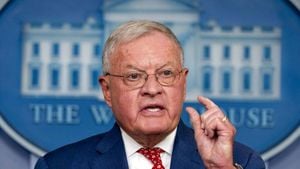Pete Hegseth, nominee for U.S. Secretary of Defense under President Donald Trump, has stirred considerable controversy, particularly concerning his views on key international alliances and humanitarian conventions. Over the past several months, Hegseth has released two books outlining his hardline perspectives, which many experts view as indicative of potential shifts in U.S. foreign policy.
His most salient critiques are directed at NATO and the United Nations. Hegseth has labeled NATO as "a relic" and stated, "If you love America, you should love Israel," firmly tying U.S. foreign policy to Israel's interests. He ventures so far as to suggest disregarding the Geneva Conventions, which guide the conduct of warfare, and instead advocates for American military forces to operate without these international restrictions.
Hegseth's rhetoric echoes the sentiments of extreme nationalism, portraying alliances such as NATO and entities like the UN as burdensome rather than beneficial. He write freely about questioning both their existence and effectiveness. "Why do we fund the anti-American UN?" he asks pointedly. His line of reasoning aligns with sentiments from other prominent political figures, including Trump, who has criticized NATO allies for not carrying their fair share of defense costs.
His writings put forth alarming assertions about Turkey's role within NATO, describing President Recep Tayyip Erdoğan as “an Islamist with Islamic visions for the Middle East,” and claiming Turkey's inclusion compromises the credibility and security of the alliance. He provocatively states, "Europe has already allowed itself to be conquered." Such statements set the backdrop for Hegseth’s more drastic proposals for U.S. military action, which could fundamentally alter America’s engagement on the global stage.
Hegseth's vision leans heavily on aggressive military tactics. He argues for American forces to adopt what he calls “ruthless” rules of engagement, where conventional laws of war do not apply. This stance raises concerns about the accountability of U.S. soldiers and signals a break from traditional military ethics which prioritize minimization of civilian casualties.
Hegseth appears to draw on historical references, likening the current geopolitical climate to the medieval period, declaring, "Our present moment is much like the 11th century... We need an American crusade.” His insistence on framing foreign policy within the lens of Christian nationalism has drawn scrutiny, particularly his statements declaring, “We Christians – alongside our Jewish friends… need to pick up the sword of unapologetic Americanism and defend ourselves.” This position could signal troubling theological undercurrents influencing policy.
The backlash against Hegseth’s views is significant. Many observers worry about the implication of adopting such extreme stances, particularly those aligning U.S. foreign policy too closely with religious or nationalist ideals. Critics have been quick to argue his worldview could inflame tensions with allies and embolden adversaries.
While advocates might cheer on Hegseth’s unabashedly nationalistic approach, those focused on international diplomacy caution against the rejection of multilateral agreements. Tom Hill, executive director of the Center for Peace and Diplomacy, articulates this concern, noting how Hegseth’s perspectives reflect the rhetoric common among certain extreme factions of the Republican Party, particularly those emphasizing Christian nationalism.
Hegseth argues for what he perceives as America’s moral duty to redefine its military policies, aiming for victory through overwhelming force rather than traditional methods. He has suggested, "If we treated the enemy the way they treated us, would it not be an incentive for the other side to reconsider their barbarism?" This philosophy not only challenges established military protocols but could potentially destabilize operations within allied theaters.
With this backdrop, Hegseth's nomination is currently under intense review as Congress grapples with whether or not to confirm him as Secretary of Defense. His message resonates deeply with Trump's base but has raised alarm bells among those invested in the stability of international relations.
Hegseth’s nomination serves not just as a reflection of individual beliefs but also as emblematic of the broader ideological battles within the Republican Party. For some, this nomination embodies the shift toward aggressive nationalism, for others, it signals significant risks to U.S. diplomacy, military ethics, and global standing.
Overall, Hegseth's contentious views, particularly those casting aspersion on key international institutions and humanitarian laws, suggest he envisions forging ahead with a foreign policy marked by unilateralism and military aggression. With this mindset, questions arise surrounding America’s commitment to its allies and the morally grounded principles of engaging with the world.



